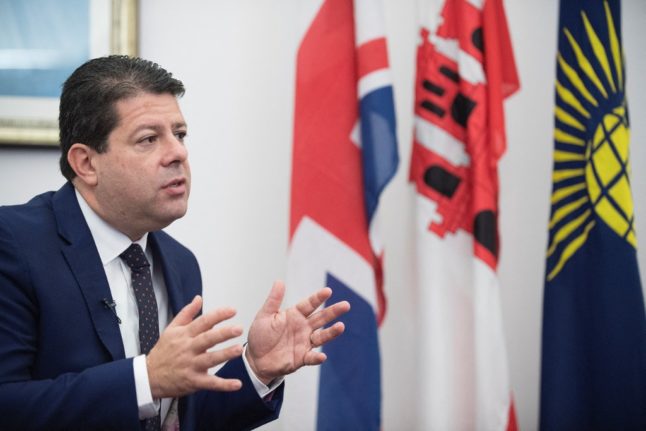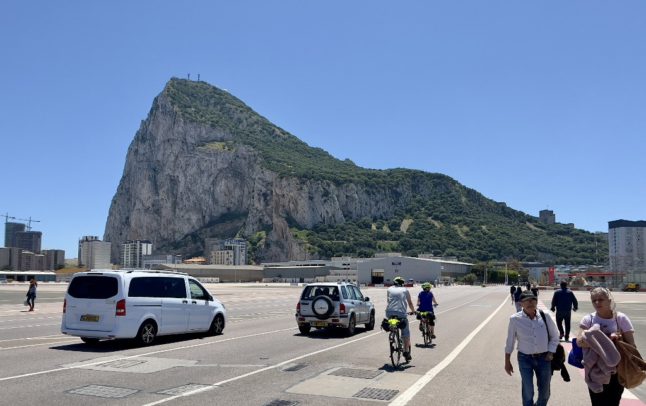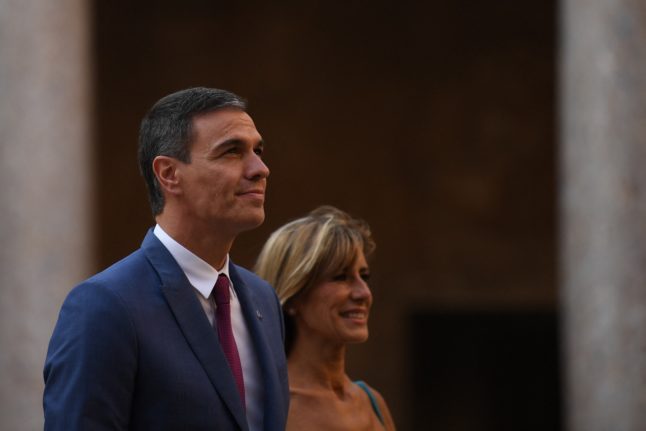As British politics tries to move on from Brexit, the tiny British territory at the southern tip of Spain, Gibraltar, has been stuck in political limbo since the referendum all the way back in 2016.
Gibraltar, which voted in favour of Remain during the referendum by a whopping 96 percent, was not included in the Brexit deal and has instead relied on a framework agreement made between the UK and Spain on New Year’s Eve in 2020.
After that framework was laid out, it was hoped that the various parties – that is, the Gibraltarian government, Spain, the EU, and the UK – would build on it and quickly find a wider treaty agreement establishing Gibraltar’s place on the European mainland in the post-Brexit world.
It was thought that Gibraltar could enter into a common travel area with the Schengen zone, limiting border controls and essentially creating a custom-made customs arrangement with the EU.
But since then, the negotiation process has stopped and started, with no deal being made and uncertainty dragging on through 2021.
Despite all parties still being relatively optimistic in the spring of 2022, no resolution has been found and 2023 is approaching.
Relying on the framework agreement alone, uncertainty about what exactly the rules are and how they should be implemented have caused confusion and long delays on the border.
The roadblocks
Progress in the multi-faceted negotiations to bash out a treaty and determine Gibraltar’s place in the post-Brexit world have repeatedly stumbled over the same roadblocks.
The main one is the issue of the border. Known in Spain and Gibraltar as La Línea – meaning ‘the line’ in reference to the Spanish town directly across the border, La Línea de la Concepción – the subject of the border and who exactly will patrol it (and on which side) has been a constant sticking point in negotiations.
Madrid and Brussels have approached the British government with a proposal for removing the border fence between Spain and Gibraltar in order to ease freedom of movement, Spain’s Foreign Minister José Manuel Albares said in late November 2022. There has been no immediate response from London.
The Gibraltarians refuse to accept Spanish boots on the ground and would prefer the European-wide Frontex border force. The British government feel this would be an impingement on British sovereignty. There’s also been the persistent issues of VAT and corporation tax considerations, as well as the British Navy base and how to police the waters around it.
Though there had been reports that the ongoing British driving license in Spain fiasco had been one of the reasons negotiations had stalled, the British ambassador to Spain Hugh Elliot categorically denied any connection between the issue of Gibraltar’s Brexit deal and British driving licence recognition earlier in November.
READ ALSO: CONFIRMED: Deal on UK licences in Spain agreed but still no exchange date
On different pages?
Not only do the long-standing sticking points remain, but it also seems that the various negotiating parties are on slightly different pages with regards to how exactly each seems to think the negotiations are going.
Judging by reports in the Spanish press in recent weeks, it appears that many in Spain may believe the negotiations are wrapping up and a conclusion could be found by New Year. This perception comes largely from comments made by Pascual Navarro, Spain’s State Secretary to the EU. Speaking to reporters in Brussels, Navarro claimed that negotiations have advanced so well that they were now only working ‘on the commas’ of the text – that is to say, tidying it up.

“No issue that is blocked,” he said. “All of the text is on the table.” A full treaty, he suggested, could be signed “before the end of the year.”
Yet it seems the Gibraltarians don’t quite see the progress as positively as their neighbours. Last week the Gibraltar government, known as No.6, acknowledged Navarro’s optimism.
According to Gibraltar’s Chief Minister Fabian Picardo however, though negotiations are ongoing, “we’re not there yet”.
No.6 remains positive and hopes for a deal, but in recent weeks has also published technical contingency plans for businesses to prepare for what they are calling a ‘Non-Negotiated Outcome’ – effectively a ‘no-deal’ in normal Brexit jargon.
The UK, however, seem to be somewhere in the middle. Like Navarro, the British Foreign Secretary James Cleverly recently suggested at a House of Commons select committee that only “a relatively small number” of issues remain to be resolved.
However, he also acknowledged the possibility of a non-negotiated outcome. “I think it’s legitimate to look at that [planning for a non-negotiated outcome] as part of our thinking,” Mr Cleverly said. “But obviously we are trying to avoid an NNO.”
Election year
If no deal is found by New Year, that would mean that negotiations drag into 2023 – election years for both Picardo and Pedro Sánchez, Spain’s Prime Minister.
Gibraltar is expected to have elections sometime in the second-half of the year, and Sánchez has to call an election by the end of 2023.
In many ways, Spanish domestic politics has the potential to play a far greater role in Gibraltar’s fate than British politics. In fact, the shadow of Spanish politics looms over these negotiations and the future relationship between Spain and Gibraltar, the UK and Spain, and the UK and EU.
If Sánchez’s PSOE were to lose the election, which according to the latest polling data is the most probable outcome, then it would be likely that Spain’s centre-right party PP would seek to renegotiate, if not outright reject, any deal made.
READ ALSO: Who will win Spain’s 2023 election – Sánchez or Feijóo?
If PP are unable to secure a ruling majority, however, they may well be forced to rely on the far-right party Vox, who have often used nationalist anti-Gibraltar rhetoric as a political weapon. If Vox were to enter into government, which is unlikely but a possibility, it’s safe to say any agreement – if one is even reached before then – would be torn up and the Spanish government would take a much harder line in negotiations.
As the consequences of Brexit churn on in Britain, in Gibraltar uncertainty looms.



 Please whitelist us to continue reading.
Please whitelist us to continue reading.
Member comments